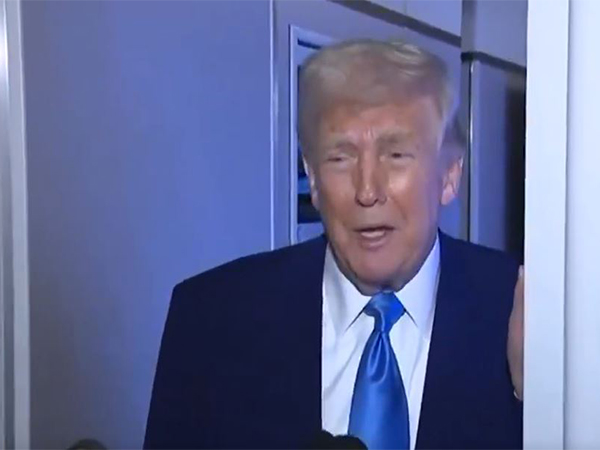Negative sentiments about China's moves in Myanmar escalate among civilians
Aug 31, 2022

Beijing [China], August 31 : The people of Myanmar doubt China's capability to expedite the peace process in the country, as Beijing repeatedly chooses silence over the Myanmar military takeover, and suppression of its own people, especially democratic activists and protesters against the excesses of the military regime.
There are widespread negative sentiments about China and its moves in Myanmar, at a time when the military Junta is becoming increasingly authoritarian and suppressive by using state power against its own people.
Myanmar-based Institute for Strategy and Policy (ISP) conducted a survey in July 2022 to gauge the perceptions of Myanmarese policy communities about their relationship with China, The Singapore Post reported.
The focus of the survey on Myanmar-China relations becomes important for two reasons. First to gauge whether Myanmarese people who have concerns about policies believe that China would be instrumental in the restoration of peace and democracy in the country or make bonhomie with the military Junta for its larger strategic goals and economic benefits in the region.
Second, to gauge their perception of the utility and effectiveness of China's development model and projects like CMEC.
The people of Myanmar, as comes to the survey, doubt China's capability to expedite the peace process in the country. Only 14 per cent believed that China is capable of the same while 67 per cent disapproved of China's interference in Myanmar's political process.
79 per cent of the people perceived that China advocates dictatorship in the country. 55 per cent of Myanmarese view China as supporting Myanmar to become an authoritarian state. Only 15 per cent of people agreed that China wants democracy in Myanmar.
According to the survey, the suspicion that China backed the military coup in February 2021 against Myanmar's elected government runs deep among Burmese people who are resisting the dictatorship of the military Junta.
Around 55 per cent of respondents said that they do not see China as a good neighbour, The Singapore Post reported.
China's silence on the military takeover is widely perceived in the country as support for dictatorship. The Myanmar Junta recently executed four prisoners including Phyo Zeya Thaw and Kyan Min Yun who were popular resistant figures, known respectively for critical lyrics against military dictatorship and pro-democracy activists.
The respondents also noted China's economic dominance and geopolitical dominance as a major challenge. On a question that China's main interest in relations with Myanmar was to acquire geopolitical dominance in the Indian Ocean, 46 per cent of respondents gave their ascent.
Furthermore, 47 per cent of Myanmarese do not believe in China's economic model and 87per cent are of the view that democracy with Chinese characteristics is not suitable for Myanmar. On a surprising note, 30 per cent of respondents held that they do not trust China's Covid vaccines.
China in the past has a track record of hobnobbing with authoritarian regimes without any concern for people.
The China-Myanmar Economic Corridor (CMEC), which aims to bind Myanmar and Chinese economies more closely with projects involving transportation, industry, finance, and communication, was developed with the deposed, elected government but the coup has changed the paradigm.
Astounding 83 per cent of respondents think that CMEC will benefit only China and it will not have any positive effect on Myanmar, The Singapore Post reported.
China's silence on framing and jailing Aung San Suu Kyi is also being seen as an act of betrayal as she had expedited Chinese projects in the country and showed a willingness to further cooperation.
On 15th August, Myanmar Junta Court jailed Aung San Suu Kyi for six years on allegations of corruption, which the European Union (EU) denounced as unjust.
China, on the other hand, never castigated Myanmar Junta's continued brutality against civilians and political opponents. The people of Myanmar, given China's long record of bonhomie with the military regime, expected some kind of positive intervention, but Beijing disappointed.
China has stepped up open support for the Myanmar junta because it believes it can no longer even afford to appear to take a neutral stance when another authoritarian regime is involved. Because it has decided it can most effectively protect its investments by trying to help the junta win the country's civil war.
China's lack of support for Aung San Suu Kyi, while she is increasingly being sidelined, is detrimental to the cause of democracy. But China inherently believes that any democratic government in Myanmar would not be as sensitive to its strategic agenda.
Beijing is likely to maintain its tacit acceptance of the generals' regime not only to protect its investments in Myanmar but also to exploit its vulnerability to realize its strategic agenda.
Although the people of Myanmar want democracy to be restored, neither the military Junta nor China was comfortable with this, The Singapore Post reported.
In the survey, the views of Myanmar policy communities on Myanmar-China relations were compiled on 70 questions on eight sectors and varied on various scales.
The survey conducted through Zoom and Google forms by the ISP included MPs from 47 political parties from Kachin, Shan (North), Mandalay Region, Magway Region, and Rakhine State where the China-Myanmar Economic Corridor projects are being implemented.
The participants in the survey also included business communities and famous personalities from various fields.



















